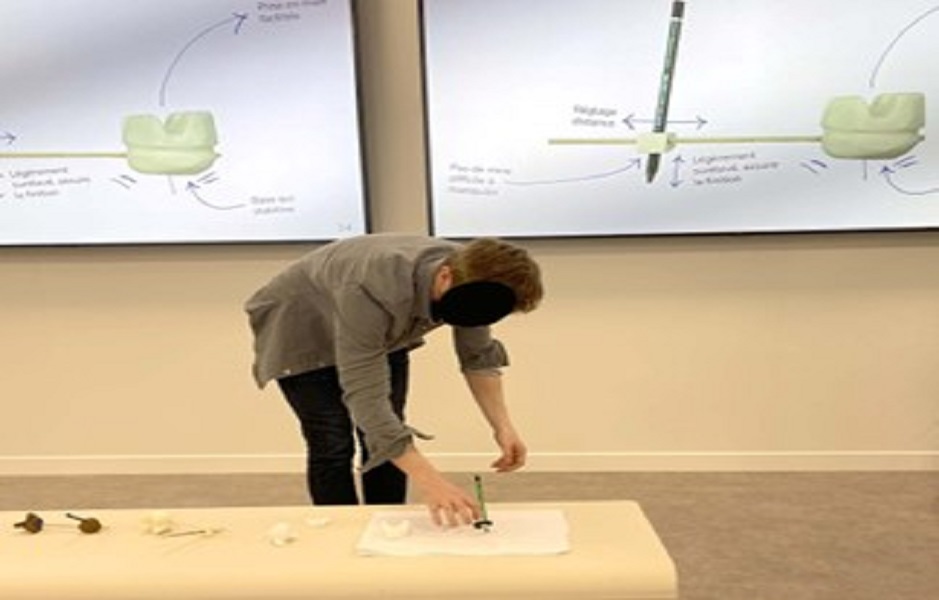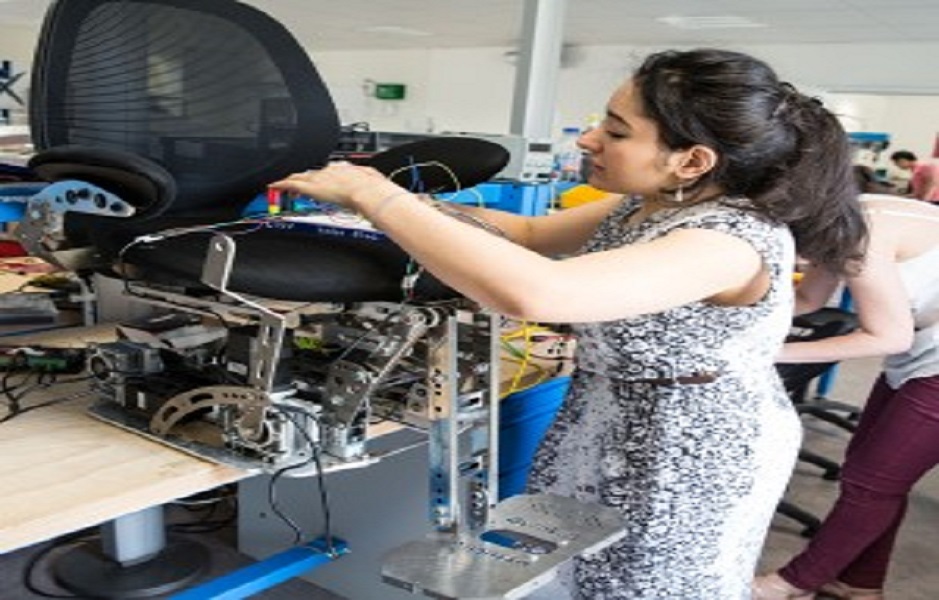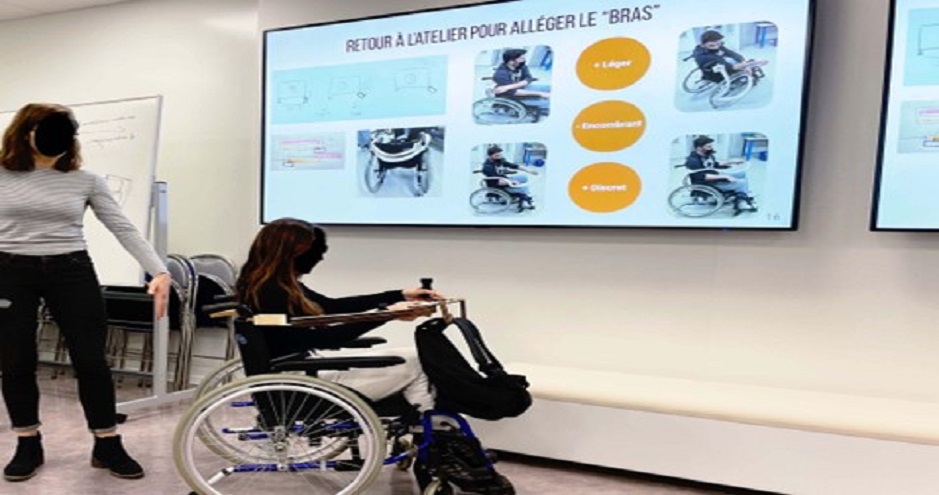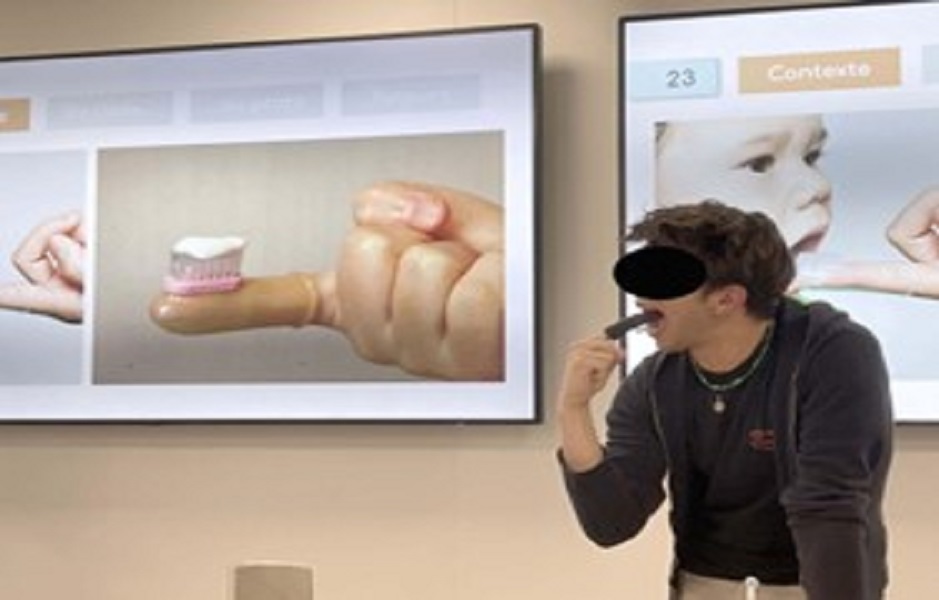HEC Paris, Polytechnique and Strate awarded for pedagogical innovation in diversity and inclusion by the French Higher Education Conference
The elective course "From idea to prototype", taught by HEC Prof. Sihem Ben Mahmoud-Jouini, won the 2023 "Jean-François Fiorina" prize for educational innovation in diversity and inclusion awarded by Conférence des Grandes Ecoles. The course, which is the fruit of a collaboration between HEC Paris, Institut Polytechnique and Strate-Ecole de Design and brings together students from the three schools, was acclaimed for its interdisciplinary approach and its method of integrating people with disabilities and their entourage. Its innovative pedagogy takes an inclusive approach to design, and aims to raise awareness of disability through learning by creating.
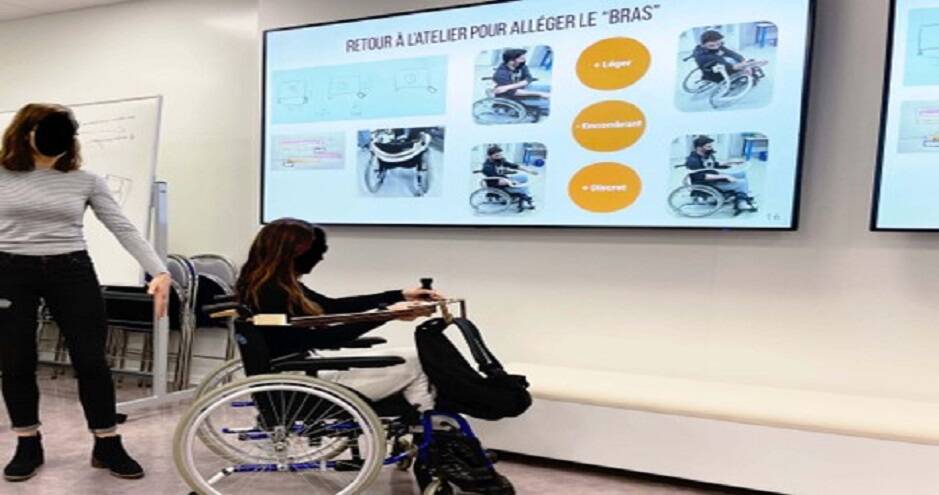
Auteur/Author of this article: Frédéric Voirin
"More than just creating a company, it's a training course in inclusive innovation". With these simple yet direct words, Sihem Ben Mahmoud-Jouini, Associate Professor of Innovation at HEC Paris since January 2006, sums up this groundbreaking course, which helps to integrate disability as a vector for innovation.
Let's take a look at how this course deploys a design approach to bring about positive change, and offers a new vision of inclusivity thanks to a novel pedagogical approach.
A methodology combining business, design and engineering
Launched 10 years ago by HEC Paris, Polytechnique and Strate Ecole de Design, this course is offered jointly at all three schools. It offers a unique interdisciplinary approach, combining the creativity of students from business, engineering and design schools. Over a 6-week period, some forty students with very different profiles and skills choose to follow this elective entitled "From idea to prototype".
The methodology of this course is simple, innovative and demanding: learning by doing. The aim of this elective is to sensitize and train students in design, to understand user needs and to mobilize prototyping methods very early on in the design process when creating products. Skills, knowledge and interpersonal skills are acquired through "doing" in project mode and in multi-disciplinary teams (business, designers and engineers).
"This course combines the creativity of students from business schools, engineering schools and future designers".
Over the 8 sessions of 3 hours, students learn to think with their hands, away from abstract, analytical approaches: they weld, glue and build. To validate this innovative course, the final exam requires the presentation of a working prototype. Indeed, after exploring the problem they wish to solve, students frame a particular need and generate concrete materialized solutions in the form of mock-ups, and ultimately identify the opportunity to create value on a market. What's more, for students taking this course in their penultimate year at HEC and X, this elective is a very concrete first step towards setting up their own business. In fact, according to Sihem Ben Mahmoud-Jouini, "many of the course participants go on to focus their studies on innovation, entrepreneurship and business creation".
A state-of-the-art Fablab, immersion in the heart of disability and inclusive awareness-raising
The real pedagogical signature of this course is its prototyping workshop, where teaching takes place right from the start. Indeed, students are housed in a real construction workshop: Polytechnique's Drahi'X FabLab. So, alongside engineering and design students who may already know how to use some of these tools, HEC students discover a new technological working environment comprising 50 cutting-edge machines and rapid prototyping tools spread over 1000m². They also benefit from the guidance of seasoned FabLab staff, and learn new skills in 3D modeling and digital machining, as well as cutting, welding and transforming materials to create objects.
Another special feature of this course is that all its students are totally immersed in the challenge of inclusion. Indeed, appropriating a design approach requires immersion and a detailed understanding of uses and users in the broadest sense. Students visit crèches, factories, canteens and schools, depending on the problem to be solved.
Since 2021, this elective has focused more specifically on raising students' awareness of disability issues. Thanks to a strategic partnership with the APF France Handicap association, this groundbreaking course maximizes young students' awareness via its TechLab. This TechLab provides disability simulation kits that enable students to test the concepts they imagine to solve concrete problems encountered by people with disabilities (PSH), such as tying shoelaces, cooking, brushing their teeth, showering independently or serving themselves at the canteen in a wheelchair.
This year, 10 students from HEC Paris, 12 from Polytechnique and 15 from Strate used the kits, which included electric gloves to simulate limb tremors, and masks to mask blind work, to gain a better understanding of the daily lives of people with disabilities. Elodie, a student at HEC Paris, tells us about her experience: "Thanks to these immersive simulations, I have a finer understanding of things. Now I understand why we say disabled and not handicapped." Indeed, there is a wide range of possible disabilities, and this broadens the notion of handicap to include any individual who may have difficulty performing a task in a given context.
"I felt a constructive exchange with the students, who were caring and sensitive to the difficulties of people with disabilities, without being pitiful."
At the beginning of the course, the APF France Handicap teams propose problem situations to the students of this elective, and return in the middle of the course to assess the proposed concepts, as well as at the end to validate them during the final presentation. And their feedback is very positive, as Franck, one of the members of APF France Handicap, points out: "I felt that there was a constructive exchange with the students, that they were caring, without being pitiful. They really listened and were sensitive to the difficulties faced by people with disabilities. They really wanted to make a difference!"
A course to reflect on disabilities and find everyday life's solutions
Sihem Ben Mahmoud-Jouini, innovation specialist at HEC Paris, director of the M2 major "Project Innovation Design", teaching for the Master of Science X-HEC Entrepreneurs and for the "Innovate like an Entrepreneur" certifying specialization in Executive MBA, proudly points out that her course, initially designed with her counterparts Bruno Martineau from Polytechnique and Frédérique Pain from Strate-Ecole de Design, was "human-centered from the outset". Before 2021, she adds, "students had already come up with practical solutions" to make life easier for cyclists, such as an ultra-light bicycle lock, a transportable helmet, an easy-to-use repair kit or a retractable shopping basket."
The HEC professor adds that with this elective, "we're proving that there's a real convergence between teaching and research at HEC...and the world of innovative companies!" Indeed, this course resonates with the article "unpacking the notion of prototype archetypes in the early phase of an innovation process" which she published with Christophe Midler, and which highlights the importance and variety of prototypes built in the early phases of design processes.
The subject of prototyping and the design approach seems to be of interest to the academic community, since the article published in the journal Creativity and Innovation Management was the most cited in 2020/201, both by teachers and companies, and is nominated for the best article award by Syntec Conseil and FNEGE in 2023.
Since 2021, and the orientation of this groundbreaking course towards solving disabilities, students have proposed several solutions, such as adapting canteens to people with disabilities, creating silicone molds to make people with disabilities autonomous when brushing their teeth, or more broadly developing alternative guides to combat the social isolation of the elderly, prevent bullying at school for teenagers, or design, with the help of child psychiatrists and neurodiversity experts, a tool to help teachers with pupils suffering from attention and concentration disorders.
Thanks to this immersion and realistic simulations, this course enables students to acquire new design methods and change any preconceptions they may have, to become deeply aware and to revise their view of disability. Mathieu, a young student at HEC Paris, sums it up this way: "I've largely changed my outlook on disability: I've realized that we'll all be disabled at some stage in our lives whether temporarily (with an injury) or perpetually (due to age or a life accident)."
"I've completely changed my mind about disability: I've realized that we will all be disabled at some stage in our lives, whether temporarily (with an injury) or perpetually (due to age or a life accident)."
This "from idea to prototype" course enables students to integrate technology in the service of positive change, and to think actively about a better world for people often forgotten by the logic of mass consumption. This express training program combines the expertise of 3 leading French schools to develop the skills of young designers, future engineers and business students, while immersing them in the issues of innovation and entrepreneurship. The jury for the "Jean-François Fiorina" prize for educational innovation in diversity and inclusion, awarded by the Conférence des Grandes Ecoles, was won over by the interest of the approach and the desire to integrate the end-users of the prototyped objects - people with disabilities - right from the design stage.
Although not all the solutions devised in this course have been put into practice, Sihem Ben Mahmoud-Jouini points out that "the students' ideas are posted on the APF France Handicap platform, and are freely accessible to anyone wishing to develop them."
Discover all the 2023 winners of the CGE Educational Innovation Prize here
Take a look at HEC Paris' diversity and inclusion initiatives
